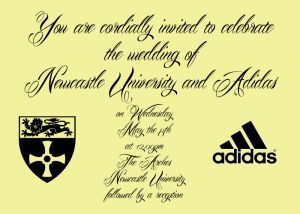Newcastle University ♥ Adidas
Simon Childs
Newcastle University has made a deal with Adidas. The sportswear giant is giving the Students’ Union £30,000 and promising them visits from celebrity athletes. In return, Adidas will be the union’s preferred sportswear provider, with advertising space in the student newspaper and the union building, where it may also get to have a shop. The suggestion of an Adidas-sponsored degree was turned down over concerns for the university’s reputation, but the corporation will give scholarships to two students. Students have already received spam on their academic email addresses from adidas@ncl.ac.uk, and Adidas will be able to recruit ‘brand ambassadors’ to ‘spread the word’ about their products on campus.
Last week, a dozen or so students staged a mock wedding ceremony to protest against the deal. They were objecting not only to Adidas’s record on workers’ rights (the union said it was ‘happy with the ethical standards Adidas adheres to’ and suggested that ‘people make up their own minds using information available on the Adidas sustainability website’) but such corporate involvement in the university per se. ‘What happens when this contract runs out in a couple of years?’ said Ella Thorp, a French and Politics student. ‘I don’t think anyone’s naive enough to think that’s all they want.’
After a slightly wonky trumpet rendition of Wagner’s ‘Bridal Chorus’, the priest began:
Dearly beloved, we are gathered here today in the sight of God, under the auspices and guidance of the invisible hand of marketised education, to witness the joining of Adidas and Newcastle University in holy matrimony, a profitable estate instituted of global capitalism.
And so on until rice and flowers were thrown. At the end the priest asked: ‘Are you all in?’ – a sarcastic nod to Adidas’s slogan.
Not everyone’s against the deal. I canvassed a few opinions in the bar. ‘I think it’s a good thing. It’ll get us some publicity,’ someone told me. ‘My mate’s a rower,’ someone else said, ‘and next year they’re going to shave the three stripes into freshers’ hair as an initiation.’ Some people didn’t know about it: ‘Oh, what? Fuck that. That’s selling out hard.’ And some didn’t care: ‘I’ve got no idea about that, sorry.’
The university and students’ union carried out a consultation, but the student council was fobbed off with a presentation from Adidas, given without notice so nobody could mount a challenge to it. Thorp tried to ask some awkward questions, but ‘they couldn’t tell us anything because they were still in discussions with Adidas. When they were no longer in discussions with Adidas they had already signed the deal.’ Council members were asked not to discuss the presentation with other students because they wanted the sponsorship to be a surprise – how romantic.
A university security officer in a high-vis jacket approached the wedding party after the ceremony, brandishing a leaflet. ‘It seems like you don’t want the university to have any money,’ he said, listing the names of various companies that fund research. One of the protesters said that the businesses were just in it for profit and didn’t care about education. The security officer agreed. ‘But if it wasn’t for the companies,’ he said, ‘the research wouldn’t happen’ – a succinct way of restating the problem.
